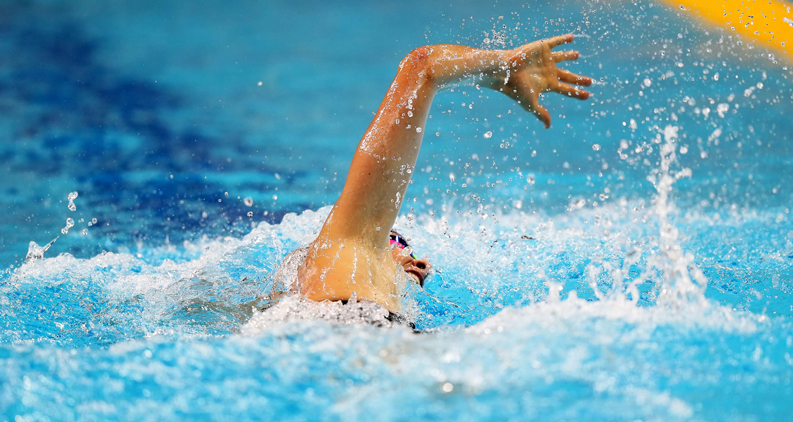
The history of front crawl swimming
March 11, 2016 About the SportWhile swimming researchers have traced the history of front crawl to originating as far back as the Stone Age, the first mention of the stroke in a competitive context was reported by The Times newspaper in 1844.
Invited to swim in a race in London, two native Americans, Flying Gull and Tobacco, were said to be lashing the water violently with their arms like the sails of a windmill and beating downward with their feet.
Observers were reported to be shocked by the stroke and its difference to breaststroke which was the only competitive stroke used in the early European swimming clubs.
The name ‘front crawl’ is thought to have come into use towards the end of the 19th century after Australian swimmer Dick Cavill described his technique as like crawling through the water.
Another breakthrough moment in the history of front crawl came in 1922 when Johnny Weissmuller became the first person to swim 100m freestyle in less than a minute.
As front crawl is the fastest of the four contemporary swimming strokes, it is swum almost universally in the freestyle event in competitive swimming.
The history of front crawl: The Olympic Games
The majority of freestyle swimmers at the first four Olympic Games used the Trudgen stroke – a hybrid of front crawl arm technique and breaststroke leg kick named after English swimmer John Trudgen.
A closer variant of modern day front crawl became the norm in freestyle races after the Stockholm Olympics in 1912 when American swimmer Duke Kahanamoku used a six-kick cycle to win 100m Freestyle gold.

While a number of freestyle distances have been contested in the history of the Olympics, there are currently six individual competitive pool distances as well as a 10km open water race.
While men’s 800m and women’s 1500m events have not yet been held at an Olympics, they will be contested for the first time at Tokyo 2020.
There are also two freestyle relays staged at the Olympic Games – the 4x200m Freestyle, which was the first Olympic swimming relay to be contested in 1908, and the 4x100m Freestyle.
English Olympic freestyle medallists (pool)
The roll call of English swimmers to have won Olympic medals for freestyle includes a few notable names in the history of front crawl.
Henry Taylor won medals at three consecutive Games from 1908 to 1920, including a hat-trick of golds in the 400m Freestyle, 1,500m Freestyle and 4x200m Freestyle Relay at London 1908.
Taylor remained the only British athlete to win three gold medals at a single Olympic Games until cyclist Sir Chris Hoy equalled the feat at Beijing 2008.
The Beijing Olympics also saw another of Taylor’s records matched as Rebecca Adlington became only the second British swimmer to win multiple golds at an Olympic Games, doubling up over 400m and 800m Freestyle.
- Paris 1900 – John Arthur Jarvis – 1000m Freestyle gold
- Paris 1900 – John Arthur Jarvis – 4000m Freestyle gold
- London 1908 – Henry Taylor – 400m Freestyle gold
- London 1908 – Henry Taylor – 1500m Freestyle gold
- London 1908 – Thomas Battersby – 1500m Freestyle silver
- Stockholm 1912 – Jennie Fletcher – 100m Freestyle bronze
- Stockholm 1912 – Jack Hatfield – 400m Freestyle silver
- Stockholm 1912 – Thomas Battersby – 1500m Freestyle silver
- Amsterdam 1928 – Joyce Cooper – 100m Freestyle bronze
- Rome 1960 – Natalie Steward – 100m Freestyle bronze
- Los Angeles 1984 – Sarah Hardcastle – 400m Freestyle silver
- Los Angeles 1984 – June Croft – 400m Freestyle bronze
- Los Angeles 1984 – Sarah Hardcastle – 800m Freestyle bronze
- Atlanta 1996 – Paul Palmer – 400m Freestyle silver
- Beijing 2008 – Rebecca Adlington – 400m Freestyle gold
- Beijing 2008 – Joanne Jackson – 400m Freestyle bronze
- Beijing 2008 – Rebecca Adlington – 800m Freestyle gold
- London 2012 – Rebecca Adlington – 400m Freestyle bronze
- London 2012 – Rebecca Adlington – 800m Freestyle bronze
English Olympic freestyle relay medallists
- London 1908 – John Derbyshire, William Foster, Henry Taylor (with Wales’ Paul Radmilovic) – 4x200m Freestyle Relay silver
- Stockholm 1912 – Jennie Fletcher, Annie Speirs (with Scotland’s Belle Moore and Wales’ Irene Steer) – 4x100m Freestyle Relay gold
- Stockholm 1912 – William Foster, Thomas Battersby, Jack Hatfield, Henry Taylor – 4x200m Freestyle Relay bronze
- Antwerp 1920 – Hilda James, Constance Jeans, Charlotte Radcliffe, Grace McKenzie – 4x100m Freestyle Relay silver
- Antwerp 1920 – Leslie Savage, Percy Peter, Henry Taylor, Harol Annison – 4x200m Freestyle Relay bronze
- Paris 1924 – Florence Barker, Constance Jeans, Grace McKenzie, Iris Tanner – 4x100m Freestyle Relay silver
- Amsterdam 1928 – Joyce Cooper, Iris Tanner (with Scotland’s Cissie Stewart and Ellen King) – 4x100m Freestyle Relay silver
- Los Angeles 1932 – Joyce Cooper, Edna Hughes, Helen Varcoe (with Wales’ Valerie Davies) – 4x100m Freestyle Relay bronze
- Montreal 1976 – David Dunne, Brian Brinkley (with Scotland’s Alan McClatchey and Gordon Downie) – 4x200m Freestyle Relay bronze
- Los Angeles 1984 – Paul Easter, Paul Howe, Andrew Astbury (with Scotland’s Neil Cochran) – 4x200m Freestyle Relay bronze
- Rio 2016 – James Guy (with Scotland’s Stephen Milne, Duncan Scott and Dan Wallace) – 4x200m Freestyle Relay silver
 Swim England Competitive Swimming Hub
Swim England Competitive Swimming Hub